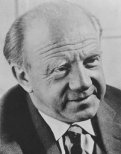| VIAS Encyclopedia provides a collection of tables and definitions commonly needed in science and engineering. |

|

Home  Science History Science History  Biographies Biographies  Werner Heisenberg Werner Heisenberg |
|||
| See also: Max Planck | |||






|
|||
Werner Heisenberg
Werner Heisenberg was born in Würzburg on December 5, 1901. His father August was a high school teacher of old languages there and a university lecturer in Greek philology. Werner Heisenberg studied mathematics and physics with Arnold Sommerfeld in Munich. In July, 1923, he earned a Dr. phil. after six semesters on the a topic of hydrodynamics. In Munich, he sought recreation in sports, which brought him in contact with nature; he mainly took part in skiing and mountain climbing. In July, 1924, Heisenberg habilitated in Göttingen and was with Bohr afterwards for nine months in Copenhagen. From 1927, he was a full professor in Leipzig. He received the Nobel Prize for Physics in 1932. After the Nazis had taken power, Heisenberg decided to remain in Germany. He believed that it was his task to save as much as much as possible from German science. From 1942, he was a director at the Kaiser (emperor) Wilhelm Institute for Physics in Berlin. After the end of war, he was nine months in American and English internment. Afterwards he worked again in Göttingen at the Max Planck Institute for Physics and Astrophysics. From 1958, the Institute was moved to Munich. He remained the director until 1970. On February 1, 1976, he died from cancer in Munich.
|
|||
Home  Science History Science History  Biographies Biographies  Werner Heisenberg Werner Heisenberg |
|||
Last Update: 2010-12-15


